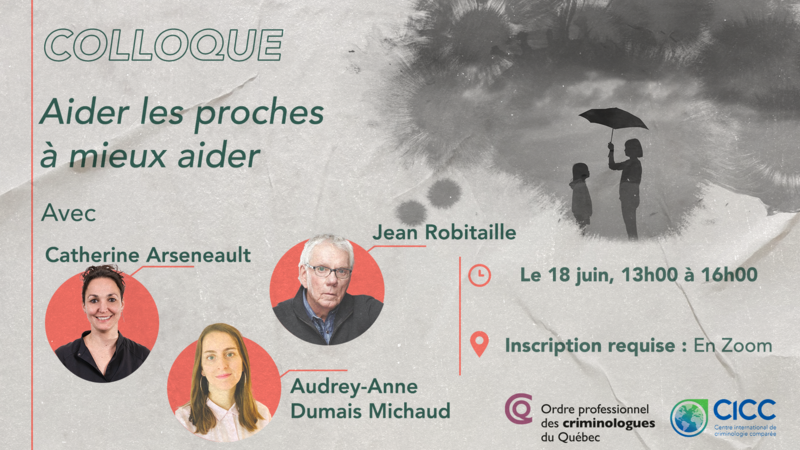
This colloquium is co-organized by the Centre International de Criminologie Comparée and the Ordre Professionnel des Criminologues du Québec, and comprises three presentations.
This free activity will be recognized by the OPCQ as continuing education for its criminologist members.
Tuesday June 18, from 1:00 pm to 4:00 pm, in Zoom.


Jean Robitaille
Caring, equipped with best practices and real-life experience, Jean Robitaille has become a reference in helping loved ones affected by the dependency of a loved one. After distinguishing himself in the artistic world, he has put his sensitivity and knowledge to good use by working with the Family Program at Maison Jean Lapointe for the past sixteen years.
Addiction affects not only the person who uses, but also those who love him or her. Suffering loved ones, terrified, anxious, fearing the worst, tend to adopt behaviors that are likely to be harmful. As a result, they too become obsessed, not with a substance, but with the behaviors of the person in difficulty, leading them into an impulse to want to help at any cost, despite the negative consequences this entails. With the right help and a commitment to putting their well-being first, those around them can be transformed into a positive influence by acquiring the right understanding, behaviors and discourse.

Audrey-Anne Dumais Michaud
A professor at Université Laval's School of Social Work and Criminology, and a researcher with the CICC and the Observatoire justice santé mentale, Audrey-Anne is interested in mental health issues, interactions between individuals with mental health problems and the justice system, homelessness, marginality and profiling, specialized courts, restraint care and substance abuse.
Justice intervention has significant consequences for people with mental health problems who are already weakened by psychiatric symptoms, but also by the lack of services adapted to their needs resulting from underfunding of psychosocial services, as well as by social stigmatization (Livingston, 2013; Laberge et al., 2000). Involuntary hospitalization can be experienced as distressing and have a negative impact on future relationships with mental health services (Wyder, Bland and Crompton, 2016, Mattner et al., 2017). Furthermore, the family often becomes a key player in the care process: in addition to reducing the frequency of hospitalization and the relapse rate, the involvement of loved ones promotes better compliance with pharmacological treatments (Harisson, 2016, Beaucage et al., 2014). Yet there is little data on the interactions between families of people living with mental health problems and the justice system (Otero, 2010; Daneau et al., 2014). This presentation aims to discuss the experiences of family caregivers of people with mental health problems and their dealings with the justice system.

Catherine Arseneault
Assistant Professor at the School of Criminology of the Université de Montréal, Catherine Arseneault is interested in the transition to adulthood, drug addiction, crime desistance, adult and juvenile delinquency, the evaluation of intervention practices and programs, the drug-crime link and addiction treatment.
Attention - Votre version d'Internet Explorer est vieille de 21 ans et peut ne pas vous offrir une expérience optimale sur le site du CICC. Veuillez mettre à jour votre ordinateur pour une expérience optimale. Nous vous recommandons Firefox ou Chrome, ou encore ChromeFrame si vous êtes dans un environnement corporatif ou académique dans lequel vous ne pouvez pas mettre à jour Internet Explorer.